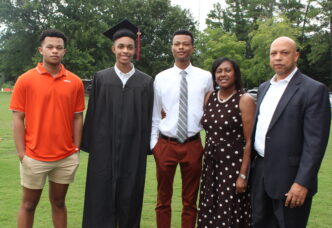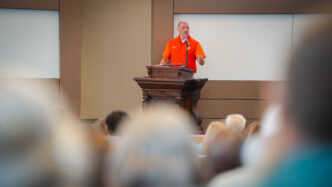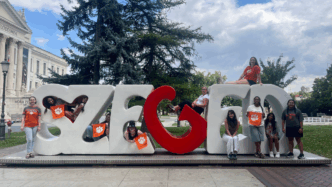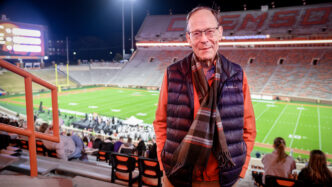Clemson Tigers have united around the University’s traditions, spurring strength and offering a little more certainty for a year unlike any other
At every college and university across the nation, classrooms and campuses looked, sounded and felt dramatically different this academic year. Clemson was no exception. But it was different.

Early on, strains of familiarity emerged in everyday life — across campus and around town. Students and staff, faculty and alumni, fans and families all found ways to do their best, even under some of the worst circumstances, at maintaining time-honored college traditions in unexpected and creative ways.
Months of planning culminated in spring and summer degrees being awarded — off campus but in person late this fall from an arena in neighboring Greenville. Students also received their Clemson Rings at a treasured Ring Ceremony, and, wearing masks and socially distanced, they discovered even more meaning from the secret phrase emblazoned below the palmetto tree on their bands: “Who shall separate us now?”
Teamwork on and off the field ensured that some of the most beloved Tiger traditions endured even amid COVID-19, forging unbreakable ties and binding the University and its people to a shared pursuit of meaning and purpose.
Military Heritage/Bowman Field
Tradition: Named for baseball coach R.T.V. Bowman, the coach of Clemson’s first sports team, the wide field separating campus from downtown Clemson originally served as the traditional parade ground for Clemson cadets. This gateway to campus remains an unmistakable part of student life today. ROTC cadets still conduct drills on Bowman Field throughout the year, and students gather there to relax, play and celebrate special events.
Clemson’s proud tradition of military excellence dates back to its founding as a military school for cadets seeking the highest academic excellence. In 1916, ROTC was instituted under the National Defense Act, and in 1917 the entire senior class enlisted in World War I.
Each year, Clemson honors this military heritage and the more than 10,000 Clemson alumni who have served in the armed forces during Military Appreciation Week, culminating in the military appreciation football game.

This year was different but no less meaningful when Clemson University honored this tradition during the 2020 military appreciation football game in November. Tiger Band played a military appreciation show from the Hill, and the University recognized its veterans with the playing of the Service Medley.
Military Appreciation Week, usually filled with in-person events, was instead recognized with a series of Zoom seminars and workshops focused on military issues, veteran welfare and the veteran experience. Leading up to military appreciation events, local veterans, alumni and Tiger fans placed American flags around the Scroll of Honor, and a 21-gun salute honored those who made the greatest sacrifice in service to their country.
Once again, Bowman Field was an epicenter for military tradition. ROTC cadets took turns running a Prisoner of War flag around Bowman Field for 24 hours straight to mark POW/MIA Appreciation Day.
Tiger Band/Tiger Rag
TRADITION: In 1942, student band director Dean Ross found the sheet music for “Tiger Rag” in an Atlanta music store and brought it back to campus to play at football games. “Tiger Fanfare” by band director Mark Spede was added in 2003, and today, the band has more than 15 ways to play what’s known as “the song that shakes the Southland!”
The COVID-19 pandemic hit in full force in March 2020, and by April, Tiger Band Director Mark Spede had already determined that the music community needed a fallback plan. That would require a much better understanding of how aerosol is emitted from band instruments so that if it were possible to play music safely during a global pandemic, the Tiger Band would be among the first to cue up.

A study on aerosols and instruments was needed, but one had never been done before. So Spede, who also serves as president of the College Band Directors National Association, formed a working committee and partnered with the National Federation of State High School Associations, raising $250,000 to study instrument air emissions, along with the universities of Colorado and Maryland.
The response was overwhelming. Spede secured support from more than 100 education and arts organizations across the country and around the world.
And though his Tiger Band started out like so many others across the nation — virtually — strict protocols for distancing, outdoor practices, cleaning and covering of instruments were developed. Soon after, they were back on the practice field, in person, and then at home in Death Valley on game day. The Tiger Band had to relocate from its normal spot in the football stands to the student section “hill” so they could spread out to play; rather than take the field at halftime, recorded performances of the marching band’s routine were broadcast on large stadium screens instead.
“If children and even college students can’t participate in music, it’s going to create such a void and it’s going to reverberate for a long time,” said Spede, who was quoted in the New York Times, among other media outlets that highlighted his work.
Rather than remain silent, Spede became instrumental in making music possible this fall for Clemson and for so many others. The Tiger Band played on for an unforgettable season in all our histories.
Homecoming/Tigerama
TRADITION: The excitement, spirit and enthusiasm of Homecoming celebrations have been a Clemson tradition since 1914, including Tigerama, one of the nation’s largest student-run pep rallies. Tigerama began in 1957 and has drawn a crowd of Tiger fans ever since.
For 64 years, Homecoming at Clemson has been synonymous with Tigerama, one of the nation’s largest and longest-running student-run pep rallies. It was clear this year that Homecoming float builds and the welcoming of alumni back to campus would not be possible. But the thought of breaking the six-decades-long tradition of Tigerama was not something Clemson students were willing to let happen.
Senior language and international business major Sydney Tindall served as director of the first-ever all-virtual Tigerama, and it proved at once one of her most challenging and rewarding college experiences. Because of the COVID-19 pandemic, mass student gatherings were not feasible, and traditional Homecoming Week events, Tigerama included, all had to be reimagined and pulled together on an abbreviated timeline. Thanks to the help of University officials and advisers, Sydney and her team of student organizers were able to successfully deliver a 64th consecutive Tigerama — this time in a 100 percent virtual format broadcast on Facebook and YouTube.
“A year ago, we never would have thought to hold Tigerama in the way that we did,” Sydney said. “Now, it has set a precedent for how we can continue to grow this tradition and celebrate our Clemson Family through it each year.”
All told, nearly 4,000 viewers tuned in to take part.

“We decided as student leaders to make it happen and adapt and still provide that sense of a Clemson Family that we were all longing for so much during that time of the semester when things felt very out of place,” she said. “But we were still Clemson in that moment, which is something I am very proud of and thankful for.”
Senior marketing major and campus tour guide Marcus Crawford served as one of two emcees for the virtual celebration. A transfer student who now helps new transfer students get acclimated to life on campus, Marcus has a unique appreciation for the traditions that make students — old and new — feel at home at Clemson, including Tigerama.
“Tigerama being done in a new way this year speaks to the resilience of Clemson students,” Marcus said. “Tigerama not only reflected the change that every student has had to adapt to throughout this year, but it also showed the choice by students to be conquerors of change, rather than victims of change.”







